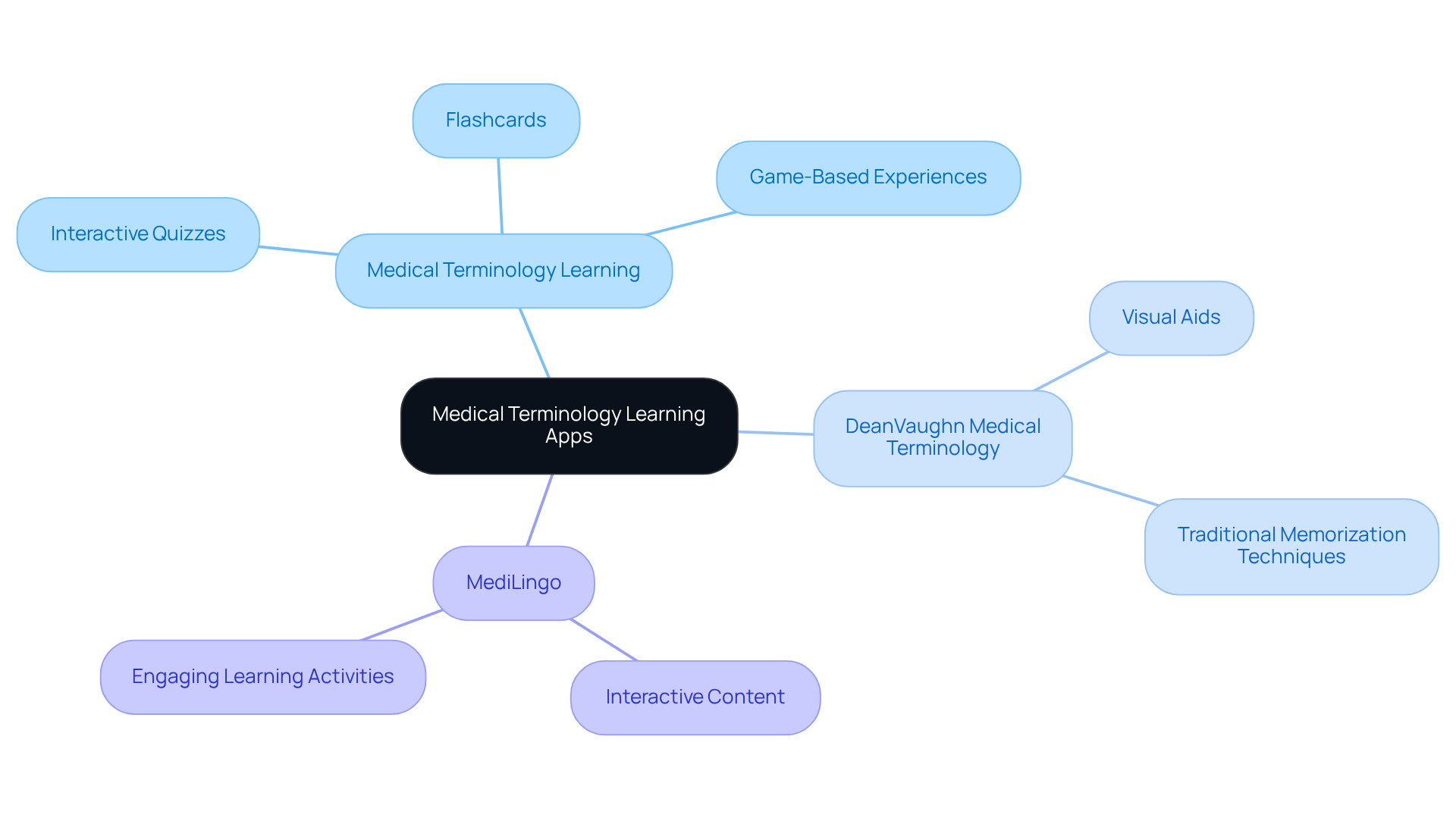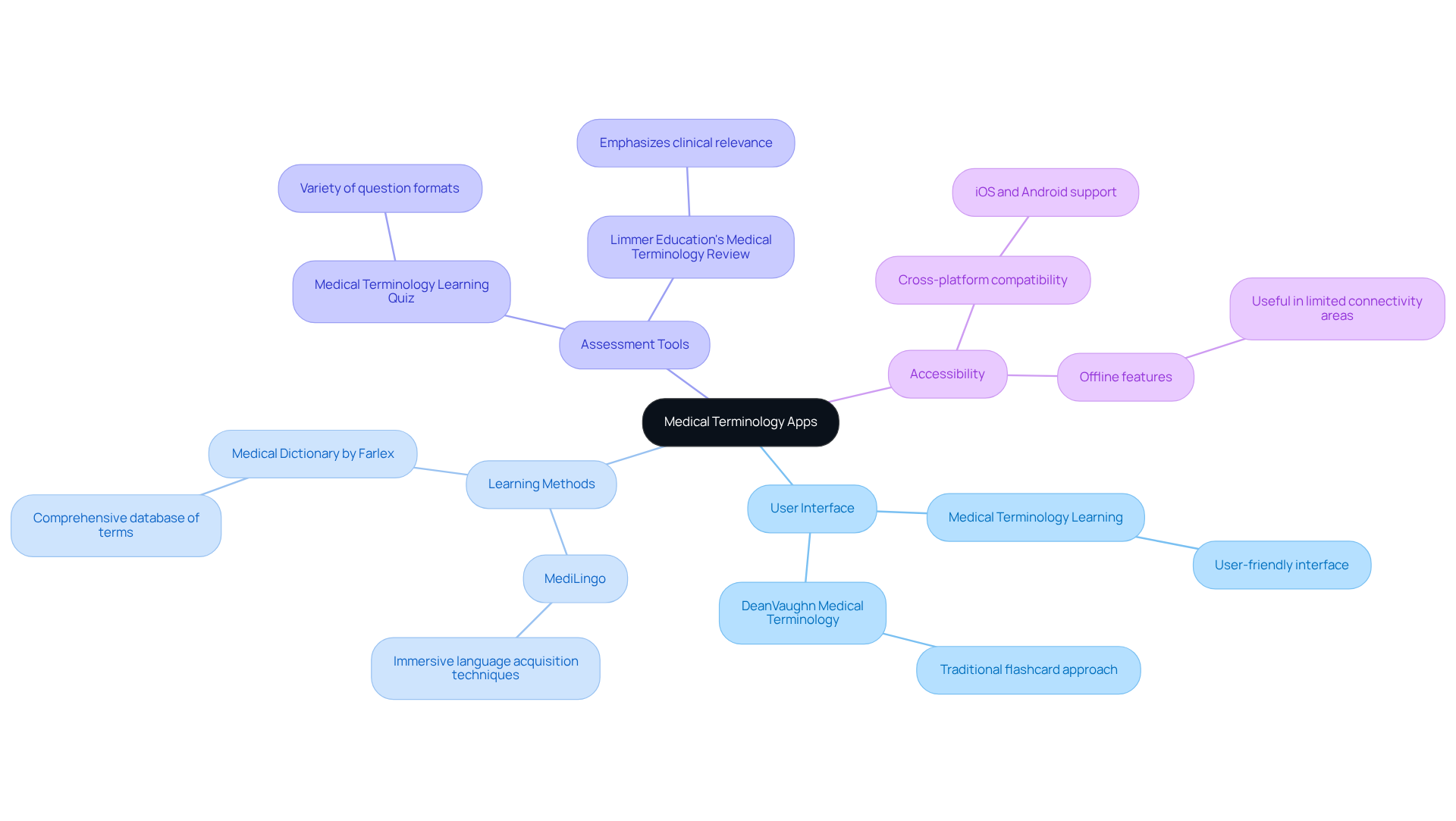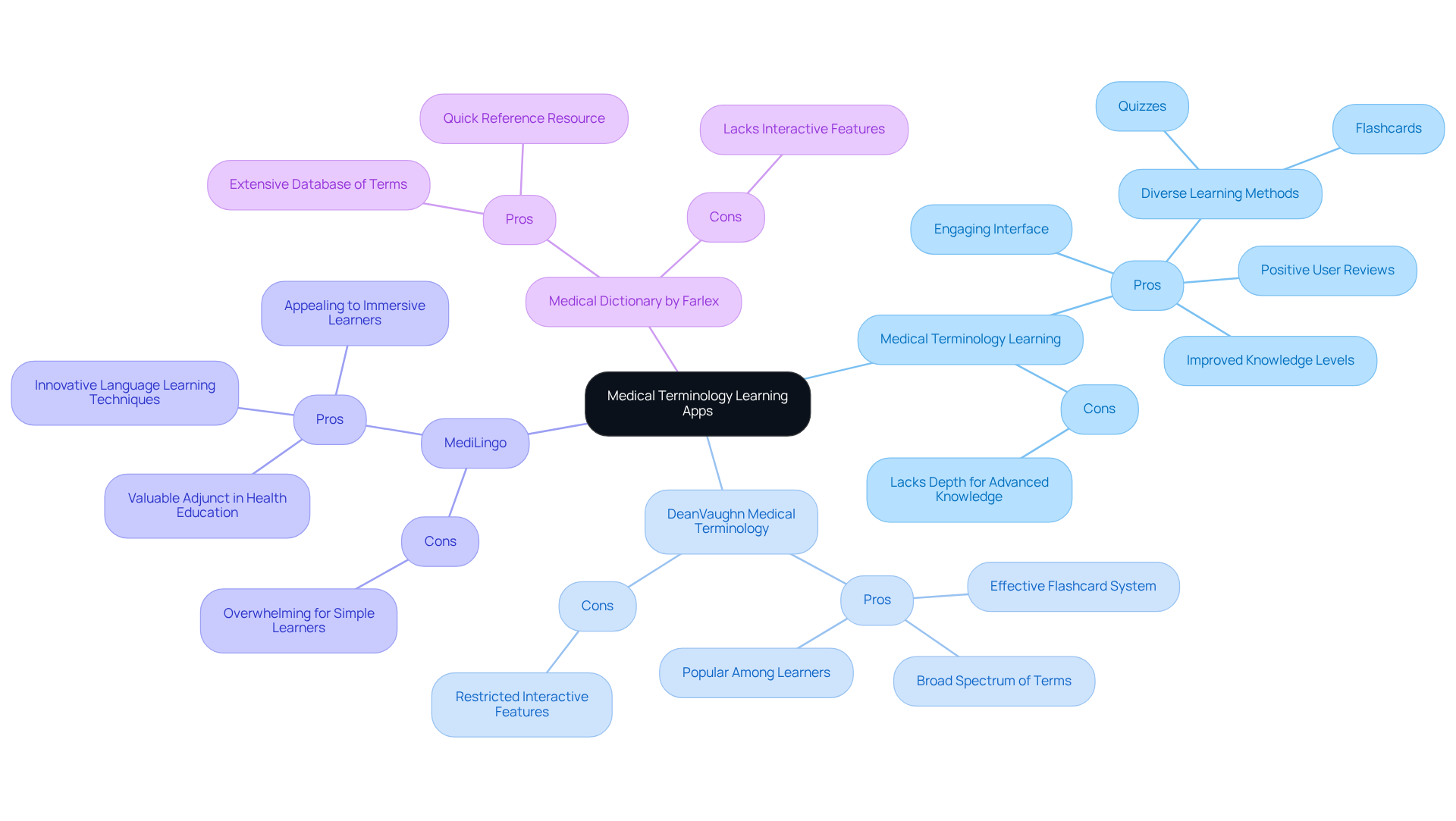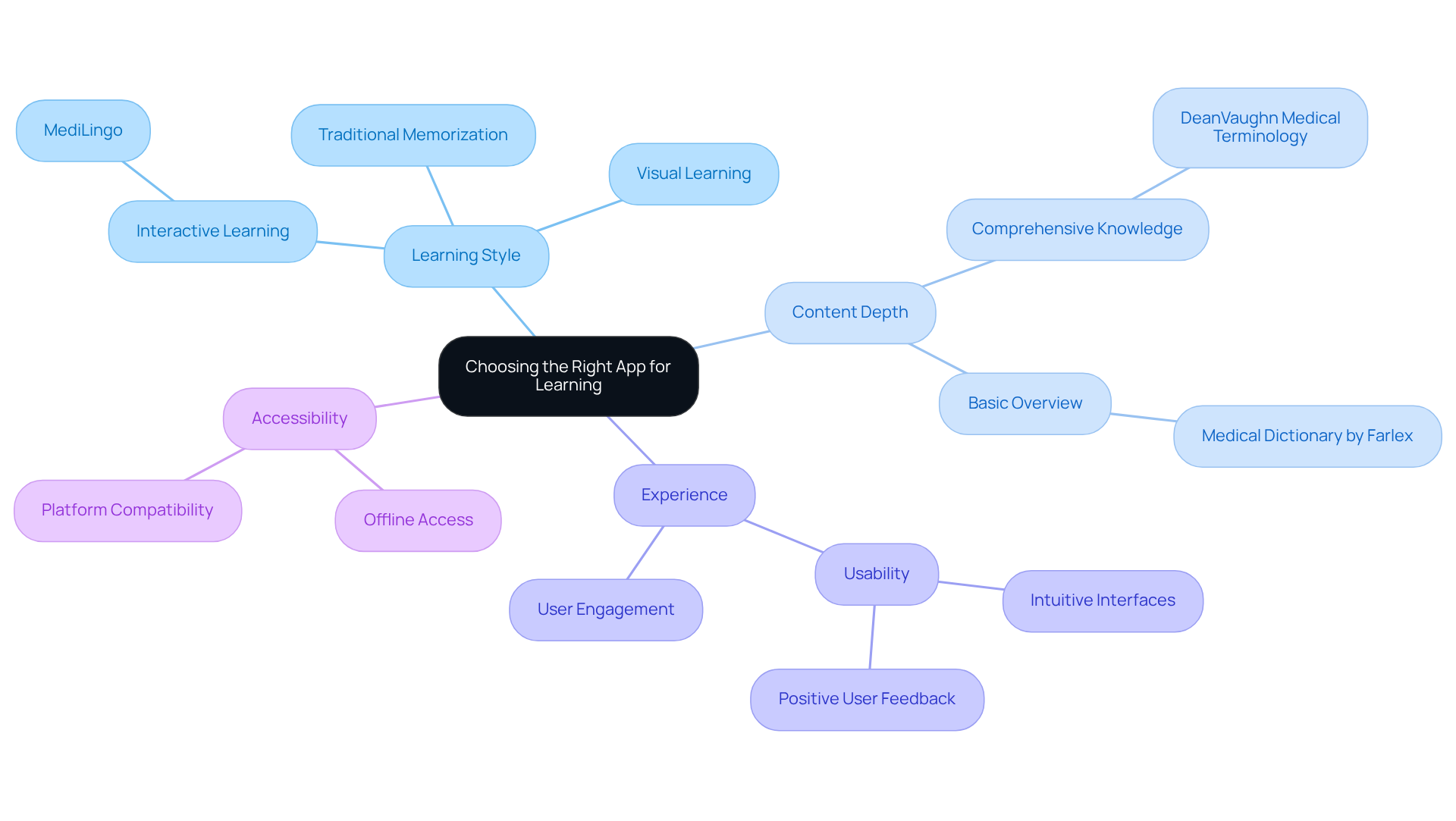Overview
In the demanding world of healthcare, providers often face emotional challenges that can impact their ability to deliver the best patient care. The article thoughtfully compares essential medical terminology apps, highlighting their features, strengths, and weaknesses. By understanding how administrative burdens can detract from patient interactions, we can appreciate the significance of selecting the right app.
Choosing an app tailored to individual learning styles, content depth, user experience, and accessibility is crucial. These factors not only enhance medical vocabulary but also empower healthcare professionals to provide improved patient care. Imagine how much more confident you could feel in your interactions with patients when equipped with the right tools.
As you explore these options, consider how each app can support your unique needs and learning preferences. Reflect on your experiences and the challenges you encounter daily. By embracing the right technology, you can transform your approach to patient care and foster a deeper connection with those you serve.
Take the time to evaluate the available resources and find the app that resonates with you. Your commitment to enhancing your skills is a vital step toward better patient outcomes and a more fulfilling career in healthcare.
Introduction
The landscape of medical education is evolving, and it’s understandable that healthcare professionals are feeling the pressure to adapt. With the intricate language of medicine becoming more complex, many are turning to technology for support. App-based learning tools have emerged as vital resources, providing interactive experiences that cater to diverse learning styles and needs. Yet, with so many options available, how can providers discern which app will truly enhance their understanding of medical terminology?
Exploring the unique features and benefits of leading applications can illuminate the path to effective learning. These tools not only help in mastering medical terminology but also play a crucial role in improving patient care. By embracing technology, healthcare providers can alleviate some of the administrative burdens that often hinder their ability to focus on what truly matters—their patients. Let’s take a closer look at how these innovative solutions can support your journey in medical education.
Overview of Medical Terminology Learning Apps
Healthcare professionals and students often face emotional challenges in mastering the complex language of medicine. Educational tools for app medical terminology are designed to alleviate these struggles, offering a supportive pathway to understanding. These applications incorporate app medical terminology through interactive quizzes, flashcards, and game-based experiences that enhance retention and comprehension, making learning both effective and enjoyable.
Consider popular applications like:
- 'Medical Terminology Learning'
- 'DeanVaughn Medical Terminology'
- 'MediLingo'
Each of these tools presents unique methods tailored to different learning styles. Some focus on visual aids and interactive content, while others emphasize traditional memorization techniques. This diversity allows users to choose the approach that best resonates with their learning preferences.
The rise of these educational programs reflects a growing demand for accessible resources in the ever-evolving healthcare sector. They are particularly beneficial for those who find conventional study techniques challenging. By embracing these tools, healthcare professionals can foster a deeper understanding of app medical terminology, ultimately improving patient care.
Are you ready to explore these resources? Engaging with app medical terminology educational tools can empower you to overcome barriers and enhance your knowledge. Let’s take this step together towards a brighter, more informed future in healthcare.

Feature Comparison of Top Medical Terminology Apps
When healthcare providers face the challenge of navigating medical terminology, it's essential to find the right tools that cater to their diverse needs. Several key features of leading medical terminology apps emerge, each designed with empathy towards the unique experiences of these professionals:
- User Interface: Apps like 'Medical Terminology Learning' are celebrated for their user-friendly interfaces and intuitive navigation, making them accessible for users of all skill levels. In contrast, 'DeanVaughn Medical Terminology' employs a traditional flashcard approach, appealing to those who find comfort in classic study methods.
- Learning Methods: 'MediLingo' stands out by integrating immersive language acquisition techniques, perfect for individuals seeking a more engaging experience. On the other hand, 'Medical Dictionary by Farlex' offers a comprehensive database of terms, serving as an excellent quick-reference tool for busy professionals who need reliable support.
- Assessment Tools: Many applications include quizzes and progress monitoring to enhance learning. For instance, 'Medical Terminology Learning Quiz' provides a variety of question formats to effectively evaluate knowledge retention. Meanwhile, 'Limmer Education's Medical Terminology Review' emphasizes clinical relevance, ensuring that individuals can apply their knowledge in real-world scenarios.
- Accessibility: Most applications are compatible with both iOS and Android platforms, ensuring broad accessibility for all users. Additionally, some applications offer offline features, which are especially advantageous for those in regions with limited connectivity.
This feature comparison highlights the diversity of app offerings available, each tailored to suit various educational styles and professional needs. By selecting the right tools, healthcare providers can enhance their learning experience, ultimately improving patient care and their own professional journey. Are you ready to explore these valuable resources and find the perfect fit for your needs?

Pros and Cons of Each App for Medical Terminology Learning
Each app medical terminology presents unique strengths and weaknesses that cater to different learning preferences, and understanding these can truly enhance your educational journey.
-
Medical Terminology Learning:
- Pros: This app features an engaging interface and employs diverse learning methods, such as quizzes and flashcards. Users have shared positive reviews, appreciating its interactive approach. A systematic review found that mobile applications significantly improved participants' knowledge levels, underscoring the effectiveness of such interactive tools.
- Cons: However, some users have noted that the content may lack depth for those seeking advanced knowledge.
-
DeanVaughn Medical Terminology:
- Pros: This app utilizes an effective flashcard system that aids memorization and covers a broad spectrum of medical terms, making it a popular choice among learners. User engagement metrics indicate that healthcare professionals frequently use this app, enhancing its reputation.
- Cons: On the downside, the app has restricted interactive features, which may not accommodate all educational preferences, possibly leaving some individuals desiring more engagement.
-
MediLingo:
- Pros: This app incorporates innovative language learning techniques, appealing to users who thrive in immersive environments. A study by Snashall et al. (2016) reported that healthcare applications can serve as valuable adjuncts in health education, highlighting the potential of apps like MediLingo.
- Cons: Yet, this approach may overwhelm individuals who prefer simple memorization techniques, resulting in a steeper curve of understanding.
-
Medical Dictionary by Farlex:
- Pros: This app offers an extensive database of medical terms, making it a valuable resource for quick reference and clarification.
- Cons: However, the absence of interactive educational features may restrict engagement, especially for those who benefit from more dynamic instructional tools.
This examination helps you recognize which application aligns most closely with your personal preferences and career needs, ultimately improving your terminology knowledge in the healthcare field. By considering insights from healthcare educators and systematic review findings, you can make informed choices about which app will best support your educational journey.

Choosing the Right App for Your Learning Needs
Choosing the right app medical terminology can be daunting, especially for busy healthcare providers. It’s essential to consider several key factors that can make a significant difference in your learning experience.
- Learning Style: What learning approach resonates with you? Whether you prefer interactive, visual, or traditional memorization, identifying your style is crucial. For instance, if you thrive in gamified environments, 'MediLingo' may be the perfect fit for you.
- Content Depth: Do you need comprehensive knowledge or just a basic overview? Apps like 'Medical Dictionary by Farlex' are excellent quick references, while 'DeanVaughn Medical Terminology' offers in-depth coverage of terms to satisfy your curiosity.
- Experience: Have you considered the importance of usability? Prioritize apps with intuitive interfaces and positive user feedback. A seamless experience can enhance your learning journey, making it not only effective but also enjoyable. In fact, 88% of online consumers say they wouldn’t return to a website after a poor experience, which highlights the significance of usability in app selection. As experts note, "User experience (UX) is crucial in mobile app development because it determines how satisfied and engaged users are with the app."
- Accessibility: What are your needs regarding offline access or platform compatibility? Some applications offer features that are particularly beneficial in specific environments, ensuring you can learn effectively wherever you are.
By thoughtfully evaluating these criteria, you can choose an app that meets your educational needs while enhancing your overall learning experience in the healthcare domain through app medical terminology. With over 107,000 medical apps available, making an informed choice is essential. Remember, you’re not alone in this journey—finding the right resources can empower you to provide even better care to your patients.

Conclusion
Navigating the complexities of medical language can be emotionally challenging for healthcare professionals and students. The exploration of medical terminology learning apps reveals how these tools can play a crucial role in alleviating some of these burdens. By offering diverse learning methods and user-friendly interfaces, these applications provide tailored solutions that cater to various educational preferences, ultimately enhancing comprehension and retention.
Consider popular apps like 'Medical Terminology Learning', 'DeanVaughn Medical Terminology', and 'MediLingo'. Each app presents its own strengths and weaknesses, from interactive quizzes to traditional memorization techniques. This variety allows users to select the best fit for their unique learning styles and needs. Usability and accessibility are paramount; these factors can significantly impact the learning experience and ultimately the quality of patient care.
The right medical terminology app can empower healthcare providers to deepen their understanding and improve patient care. As the demand for accessible educational resources continues to grow, embracing these innovative tools becomes essential for fostering a more informed and competent healthcare workforce. By carefully evaluating personal learning preferences and the features of each app, individuals can make informed decisions that enhance their educational journey and ultimately benefit their professional practice.
In this ever-evolving field, what steps will you take to ensure you are well-equipped with the knowledge you need? Reflect on the resources available and consider how they can support your growth and the care you provide.




